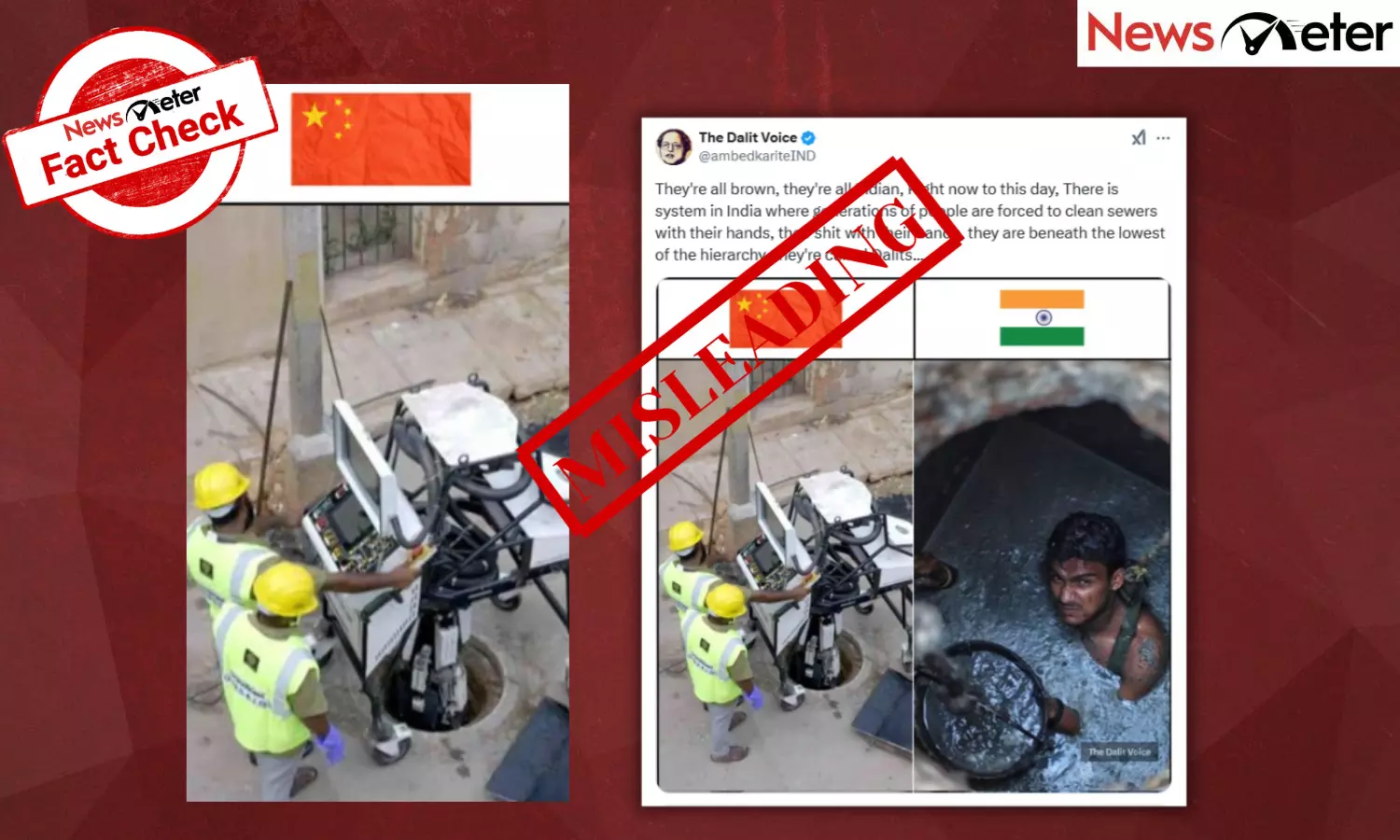Fact Check: India’s robotic sewer cleaner mistaken for Chinese tech; viral image is from Karnataka
A collage featuring two images—one showing a robotic machine cleaning a sewer and the other showing a man engaged in manual scavenging—is being shared with the claim that the robotic machine is from China.
By Md Mahfooz Alam
Claim:The image shows a robotic machine cleaning a sewer in China.
Fact:The claim is false. The image is from Mysore, Karnataka. The machine named Bandicoot was developed by engineers in Kerala.
Hyderabad: A collage featuring two images with contrasting themes has been circulating on social media. The first image shows two men operating a robotic machine cleaning sewers reportedly in China, while the second shows a man manually cleaning a sewer in India.
The collage is being shared with the claim that while China has developed advanced robotic machines for such tasks, India continues to exploit Dalits for manual sewer cleaning.
An X premium account, The Dalit Voice, shared the collage with the caption, “They’re all brown, they’re all Indian, Right now to this day, There is a system in India where generations of people are forced to clean sewers with their hands, their shit with their hands, they are beneath the lowest of the hierarchy, they’re called Dalits....” (Archive)
Fact Check
NewsMeter found that the claim is misleading. The image of a robotic machine cleaning the sewer is from India, not China.
Through a reverse image search, we found the viral image in a video report published by DW News on April 8, 2022. According to the report, the mechanical machine is cleaning a sewer pipe in Mysore, Karnataka. The machine is a prototype of India’s first sewer-cleaning robot, named after the Indian rat species ‘Bandicoot’. It was developed by a tech company in Kerala to address the problem of manual scavenging, the report stated.
The report also stated manual scavenging remains prevalent due to overwhelming sewer systems, a lack of machinery and the lower cost of labour.
We also found the same image in a Hindi video report by DW News, published on April 19, 2022. The visual of two men operating the machine, identical to the viral image, appeared at the 0:39-second mark. The report further mentioned that the robotic machine is cleaning a closed sewage pipe in Mysore, Karnataka, in the image.
Further, we searched for the Bandicoot machine and found a report by Onmanorama published on December 10, 2020, titled ‘Bandicoot, world’s first sewer cleaning robot by Kerala engineers, wins Infosys award’.
The report stated that the machine was designed by a team of nine engineers from Kerala. It was launched in February 2018 following a successful trial run in Thiruvananthapuram, where it successfully unclogged five manholes filled with plastic, filth, medical waste and sediments. The report also mentioned that the Kerala Water Authority has been using the Bandicoot robot in Thiruvananthapuram ever since.
According to a Deccan Herald report dated January 30, 2021, Mysuru became the first city in Karnataka to use the ‘Bandicoot Robot’ for cleaning underground drainage systems. Another article by Star of Mysore stated that the Mysuru City Corporation (MCC) has procured the manhole-cleaning robot, aimed at eliminating the practice of manual scavenging.
Therefore, we conclude that the image of a robotic machine cleaning a sewer is from India, not China. The claim is misleading.
Is manual scavenging still practised in India?
According to a BBC report dated October 26, 2023, manual scavenging is banned in India, yet the practice remains widespread. Many are forced into this hazardous work due to the rigid caste system and a lack of alternative livelihood options. The report also highlighted the tragic story of Umesh and Moses, who lost their lives while manually cleaning sewers.
What are the laws prohibiting manual scavenging?
According to a PIB press release dated July 19, 2022, manual scavenging has been prohibited in India since December 6, 2013, under the Prohibition of Employment as Manual Scavengers and their Rehabilitation Act, 2013 (MS Act, 2013). From this date onward, no person or agency is permitted to engage or employ anyone for manual scavenging. Violations of the provisions of the MS Act, 2013, are punishable under Section 8 of the Act with imprisonment of up to two years, a fine of up to Rs 1 lakh or both.